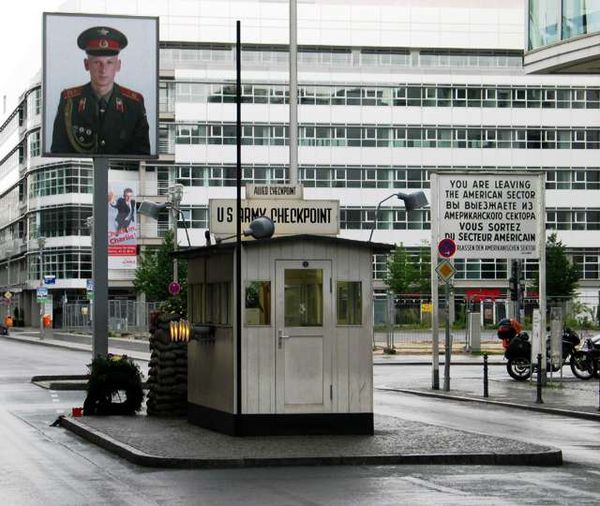
(Wikipedia)
On Remembrance Day we will again briefly stand in the cold to honour those who served and fell in defense of our freedoms. At the same time we could remind ourselves of the largely forgotten, stouthearted individuals who thwarted Joseph Stalin from taking a step many believed would lead to World War III. This is a riveting story of courage, good will, and innovative thinking on the part of a few. The events occurred at the beginning of the Cold War. At the time American, British and French politicians and generals were consumed by apprehension about Soviet intentions and military might.
Berlin had been divided into 4 sectors, controlled by Russia, France, Britain and America. It soon became apparent Stalin wanted the entire city. On June 24, 1948 the Soviets initiated the Berlin Blockade, halting trains, trucks and barges bringing coal, food, medicines, clothing, and all other essentials into the city. The 2.25 million West Berliners were already living in a gutted city in which many buildings had no roofs or windows. They now faced a bleak winter of starvation and bitter cold. The Russians wanted to starve them into submission so they would accept Soviet domination.
General Lucius Clay, Allied Occupation Commander, set up a limited airlift that brought in some supplies. He asked for more planes to expand the operation, but high ranking American officers and advisors to President Truman had no faith in the airlift. Also, 1948 was an election year and Thomas Dewey, Republican presidential candidate, was sharply critical of the airlift. He advocated for giving up West Berlin. For Germans living in this sector it was a terrifying prospect.
President Truman, dubbed an ineffectual leader, made a difficult decision. In spite of opposition from Secretary of State George Marshall, General Omar Bradley and others, he approved an additional 75 planes. At this time virtually everyone, including Clay, considered the airlift a stopgap measure to buy time. “I’m doing it because I believe it is in the best interests of America,” he said, “not because I care a bit about the Germans.” Better than his superiors, he understood that if the Allies gave up West Berlin, the Russians would run rampant over all of Europe.
Although planes were now landing with supplies every three minutes, the earlier antipathy between victors and vanquished had abated very little. The Germans understood the airlift was not based on any sense of shared humanity. To counter the Allied enhanced output, the Russians offered West Berliners ample coal, electricity and potatoes. According to Andrei Cherny in The Candy Bombers, “the Germans might have buckled that winter if the airlift had been only a movement of machines in the sky with the aim of maintaining U.S. options in this strategic outpost.”
Then something unanticipated and unplanned happened. Hal Halverson, an airlift pilot approached some German children standing outside the wire fence surrounding the airfield, watching the planes land. Contact with Germans was forbidden, so he hoped he wasn’t observed. Several of the children understood English and after a brief conversation, Halverson promised to drop a few candies for them from his plane. He knew this could result in a court martial for himself and his two crew members. He held to his commitment nevertheless and placed a few chocolate bars and several packages of gum in white hankie sized parachutes. His two crew members reluctantly threw the packages out while Halverson maneuvered the plane. Seeing them floating down, the children waved ecstatically. They had not eaten chocolate in years.
Halverson and his crew were frightened, but also exhilarated. Further drops followed and air force personnel were puzzled by the increasing number of children at the fence, all waving. Fortunately General William Tunner, officer in charge of the airlift, recognized the morale boosting value of what the three fliers were doing surreptitiously and directed Halverson to speak to the media.
Treats began arriving from America and other countries. There was so much candy other pilots, including Canadians, started dropping handkerchief-parachutes. Soon there were a thousand children, and some adults standing at the fence, waving enthusiastically.
Andrei Cherney suggests, “Hal Halverson’s candy drops were a catalyst that transformed the character of the airlift and the way Berliners thought about it and about Americans.” After 321 days the Soviets ended the Blockade. Cherney considers the airlift one of the greatest military and humanitarian successes of western democracies.
